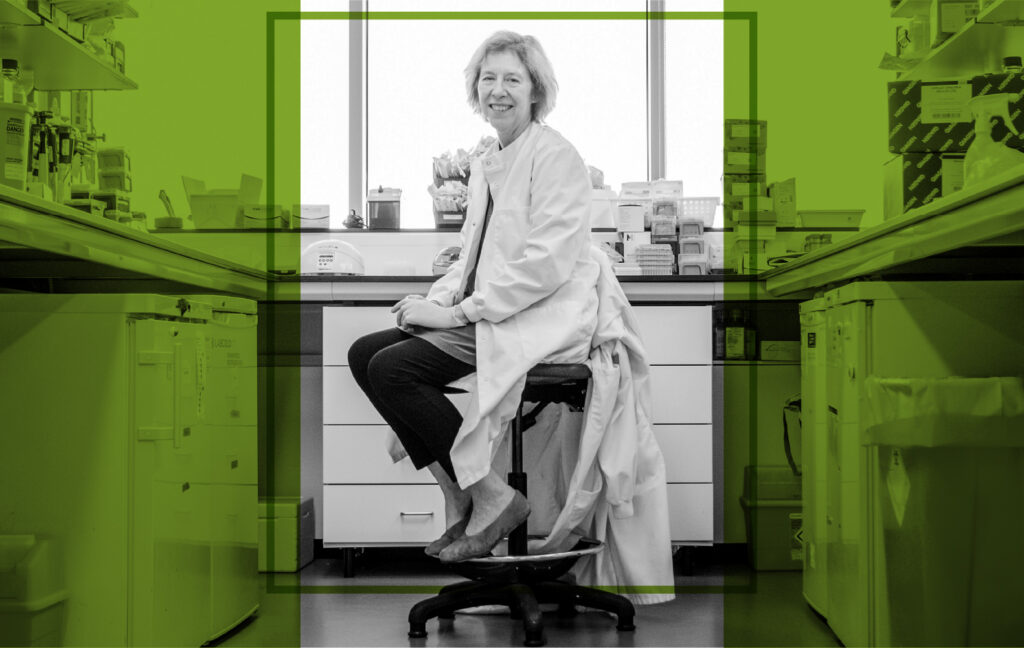13 July 2021 – As the new EMBO Director, Fiona Watt will further develop the programmes offered by EMBO to support life scientists in Europe and beyond. Ahead of her office, which will start in early 2022, we spoke with her about career support for life scientists and the role of EMBO Press in advancing scientific publishing.
For you as the incoming Director of EMBO, and as someone who is an EMBO Member and a scientist, what does EMBO stand for?
For me, EMBO stands for excellence in life science across boundaries, for fostering and promoting talent, and exchanging information regardless of where you live. The international agenda of EMBO is vitally important, today more than ever before. Our members are our strength. I’ve seen the transformative effect of an EMBO Postdoctoral Fellowship on a young person’s career. The Young Investigator Network, which brings bright people together to learn from one another, is another huge career boost. I also think that the way the EMBO funds are spent is very effective. The funds are tailored to individuals, and they can make a lifetime’s difference. The publishing innovations that have been led by EMBO are very exciting, too.
Mobility of scientists was one of the original ideas when EMBO was founded. Is it still important that there is an organization fostering mobility in the age of the internet, and during the pandemic when knowledge exchange became even more web-based?
Many scientists have been forced to work from home for over a year. To talk about mobility now may be a bit strange, but I’ve seen in my own lab that creativity can suffer if people don’t meet face to face and have unscheduled conversations. Mobility is important to exchange ideas. I believe you shouldn’t think of science as an isolated activity – the topic and where the research is conducted are both important, so funding people to move between countries can be highly beneficial. There are important lessons – and lasting friendships – that an investigator gains from experiencing another culture. Nevertheless, the last year has shown that even when individuals can’t travel they are still able to get access to great science. I’m seeing implementation of interesting software that allows virtual ‘water cooler chats’, but nevertheless enabling scientists to meet in a societal context remains important.
How does EMBO contribute to scientific publishing? In your view, what advances does the work of EMBO Press bring to the communities?
For the first time this year, my lab has submitted a manuscript through Review Commons. I said to my lab members ‘let’s just jump down this watershoot’, because we didn’t know what would happen, but thought it would be a fun ride. Review Commons is such a great idea. We got very constructive reviews for our paper. We are now revising our paper for our top choice journal.
Another area that I’m interested in is the interface between preprints and publications. Preprints have evolved a lot in the last year. But I still think that more needs to be done. When a reviewer of a paper checks whether the data are robust, it is late in the process. We know that reviewers may for instance miss technical flaws, because they’re not experts in everything. I would like to explore how we can make sure that there is a check on robustness before a paper goes through the review process. EMBO has been so innovative in publishing. There are some really interesting things that we can work on in partnership with others.
You have a long track record not only in research, but also in the management of research and funding organizations. How do you balance your passion for research with the demands and expectations of the organizations?
I love doing science, but I’m also interested in how it’s done. My adventures in publishing are because of my interest as a scientist in doing experiments, getting them published and sharing information. My role at the Medical Research Council has been very exciting and fulfilling for the last few years, but it is time to pass the baton on. Related to my personal research aspirations, being at EMBO, together with the fantastic platforms available at EMBL, gives me the freedom to evolve my work on genetic models of wound healing in mice, my studies of cultured epidermal stem cells and my work on the Human Cell Atlas. I am also excited to progress my translational studies of injecting cells into the skin to resolve scars – does this really work in the clinic? If a commercial entity is the way to answer that question, it will be intriguing. I’m very, very much an experimentalist. But above all, taking the helm at EMBO and helping the organization execute its mission is a wonderful privilege.



